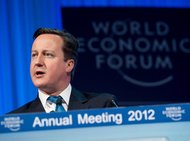LONDON — Cuadrilla Resources, a British shale gas company, has suspended drilling activity at its site in Balcombe, the village south of London that has become a focus of protests against Britain’s efforts to develop a shale gas industry.
Although the company is drilling for oil, not gas, at Balcombe, its activities there have become symbolic of the shale-gas effort in Britain because Cuadrilla has been in the forefront of shale gas exploration in northwest England. The company attracted the wrong sort of attention in 2011 when early efforts to hydraulically fracture a well in Lancashire set off minor earthquakes.
Cuadrilla said Friday that it had decided to suspend drilling after taking advice from the local police in Sussex, following “threats of direct action against the exploration site.”
The company said it was acting in the interest of the safety of its own staff, Balcombe residents and protesters. A person close to the company said that Cuadrilla was concerned that protesters might invade the site, as they have done at a Cuadrilla site in northern England. The person asked not to be identified because he was not authorized to speak about the issue.
The decision not only delays Cuadrilla’s exploration program but is damaging to the government-backed effort to develop shale and other so-called unconventional oil and gas to replace declining production in the North Sea. Britain is thought to have substantial shale gas resources but it will require extensive drilling and testing to discover whether the gas in the ground can be profitably produced.
Amid the controversy in Balcombe, Prime Minister David Cameron has weighed in on the debate. In an article published last Sunday in the Sunday Telegraph, which is considered staple reading of his Conservative Party constituents, Mr. Cameron wrote in support of fracking, the technique of pumping liquids and sand down wells to cause the rock to release trapped oil and gas.
“If we don’t back this technology, we will miss a massive opportunity to help families with their bills and make our country more competitive,” Mr. Cameron wrote.
The antifracking movement appears to be gaining momentum.. Campaigners said that protesters from throughout the British Isles were planning to converge on Balcombe this weekend in a march for “a frack-free future.”
Cuadrilla, whose chairman is a former BP chief executive, John Browne, already appeared to be backing down earlier this week when it said that while it would continue its exploration at Balcombe, the drilling site there was unlikely to become a permanent production site.
“Cuadrilla has to delay drilling until next week. That’s a huge victory,” Katriona Vetch, an activist in Balcombe, said by telephone.

Article source: http://www.nytimes.com/2013/08/17/business/energy-environment/shale-gas-company-suspends-drilling-in-southern-england.html?partner=rss&emc=rss

